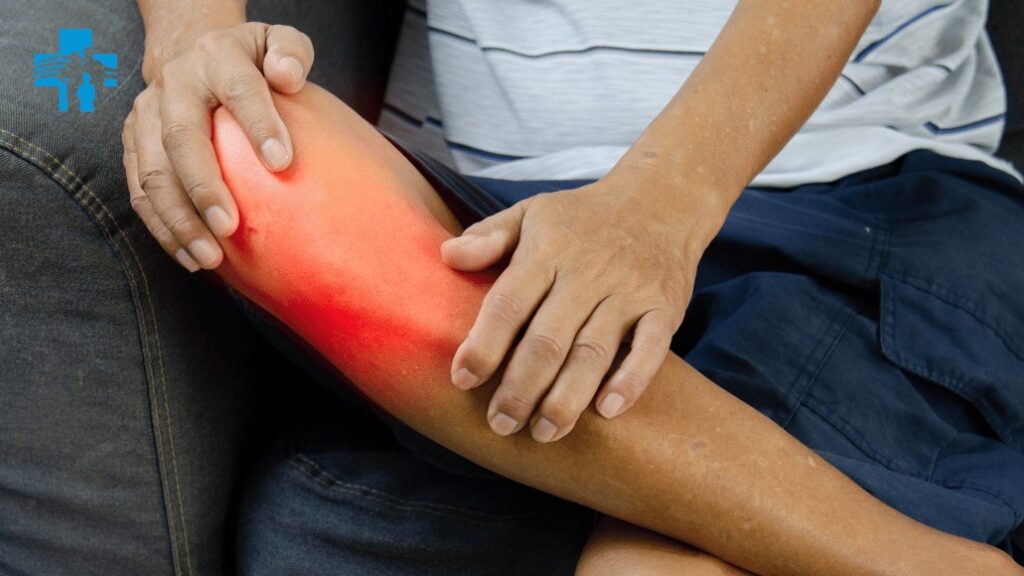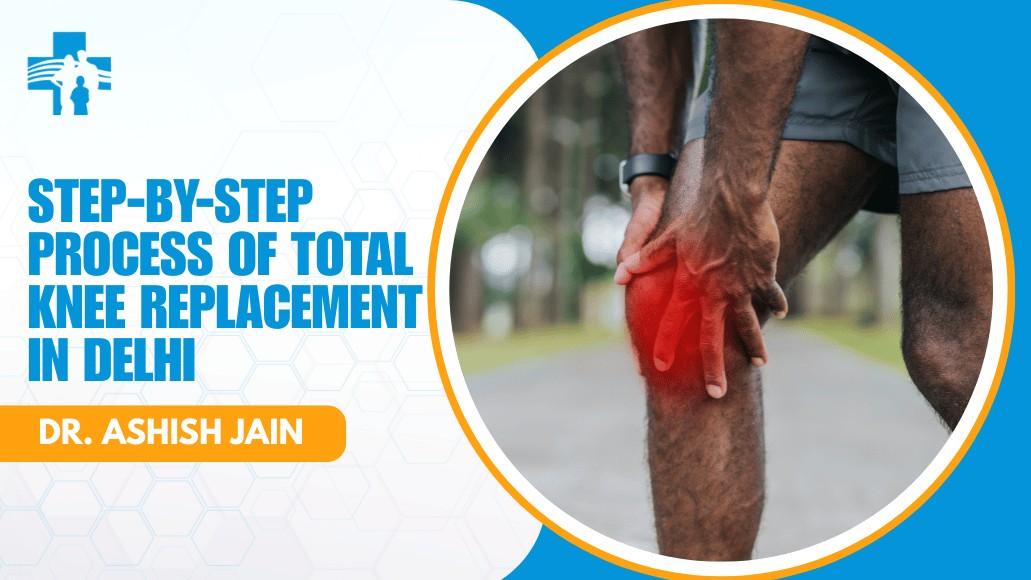Overview
Living with constant knee pain can affect every aspect of your life—from walking and climbing stairs to enjoying everyday activities. When medication, physiotherapy, and lifestyle changes fail to bring relief, Total Knee Replacement Surgery in Delhi becomes the most effective and lasting solution.
At KneeJointReplacement, under the expert guidance of Dr. Ashish Jain, patients receive world-class orthopaedic care with advanced surgical precision. Let’s understand how this procedure works, step by step, and what makes it the preferred choice for individuals struggling with severe knee pain and joint degeneration.

1. Initial Consultation and Evaluation
The journey begins with a detailed consultation with Dr. Ashish Jain, one of the most trusted orthopaedic surgeons in Delhi. During this visit, your medical history, current symptoms, and lifestyle are discussed thoroughly.
To determine if you are a good candidate for Total Knee Replacement Surgery, the doctor will:
- Conduct a physical examination to assess range of motion and knee stability.
- Recommend X-rays and MRI scans to check the extent of bone and cartilage damage.
- Review any prior treatments or medications you have taken for knee pain.
- Evaluate your overall health to minimize risks during and after surgery.
2. Preoperative Planning
Pre-surgery planning is critical to ensuring success. The medical team at KneeJointReplacement prepares a customized surgical plan for every patient, considering anatomy, age, activity level, and health condition.
Key steps include:
- Preoperative blood tests and ECG to ensure you’re fit for anesthesia.
- 3D imaging or robotic mapping, if robotic surgery is chosen, to enhance precision.
- Patient education regarding hospital stay, recovery period, and postoperative care.
- Medication adjustments, such as stopping certain drugs that may interfere with healing or anesthesia.
Patients are also advised to maintain a healthy diet and perform light exercises to strengthen muscles before surgery.
3. Admission and Pre-Surgery Preparation
On the day of surgery, patients are admitted to the hospital—usually one day before the procedure. At KneeJointReplacement, every detail is carefully managed to make the process smooth and stress-free.
- The nursing staff ensures all pre-surgical protocols are followed.
- The anesthesiologist reviews your reports and explains the type of anesthesia (either spinal or general).
- The surgical area is cleaned and sterilized to prevent infections.
The supportive staff ensures you’re comfortable and well-prepared before heading to the operating theatre.
4. The Surgical Procedure
The Total Knee Replacement Surgery in Delhi typically takes around 1.5 to 2 hours, depending on the complexity and surgical technique used.
Here’s what happens during the operation:
Step 1: Incision
A small incision is made on the front of the knee to access the damaged joint.
Step 2: Removal of Damaged Tissue
The surgeon carefully removes worn-out cartilage and bone from the surface of the femur (thigh bone) and tibia (shin bone).
Step 3: Implant Placement
Artificial metal and plastic implants are positioned to recreate the natural joint structure. These high-quality prosthetics ensure smooth movement and durability.
Step 4: Patella Resurfacing (If Required)
In some cases, the underside of the kneecap (patella) is also resurfaced with a special plastic component to improve knee movement.
Step 5: Closure
Once the implants are securely in place, the incision is closed with sutures, and the area is covered with a sterile dressing.
5. Post-Surgery Care and Recovery
After surgery, patients are moved to the recovery room, where vital signs are monitored as the anesthesia wears off. Dr. Ashish Jain and his dedicated care team ensure optimal pain management and early mobility.
Key recovery steps include:
- Pain relief medications to manage post-surgical discomfort.
- Physiotherapy initiation within 24–48 hours to promote movement and prevent stiffness.
- Use of assistive devices like walkers during the first few days of walking.
- Monitoring for infection or clot formation, ensuring a smooth recovery phase.
6. Physiotherapy and Rehabilitation
Rehabilitation is a vital part of the Total Knee Replacement Surgery process. The physiotherapy team at KneeJointReplacement works closely with each patient to create a personalized exercise routine aimed at:
- Strengthening leg muscles.
- Improving flexibility and joint stability.
- Enhancing balance and coordination.
- Preventing stiffness and promoting long-term mobility.
With regular sessions, most patients regain independence and can walk without support within a few weeks.
7. Follow-Up Appointments
Follow-up visits with Dr. Ashish Jain are scheduled at regular intervals to track healing, assess implant positioning, and monitor mobility progress.
- The first follow-up is typically within 10–15 days post-surgery.
- Further check-ups are conducted at one month, three months, and six months.
These visits ensure the recovery is on track and that the patient achieves the desired results.
Why Choose KneeJointReplacement for Total Knee Replacement in Delhi?
When it comes to Total Knee Replacement Surgery in Delhi, choosing the right surgeon and facility makes all the difference. KneeJointReplacement, led by Dr. Ashish Jain, offers:
- 18+ Years of Experience: A trusted name in knee and joint replacement procedures.
- Advanced Robotic Technology: Ensures high precision, minimal incision, and faster recovery.
- Comprehensive Care: From diagnosis to post-surgery rehabilitation, all under one roof.
- World-Class Facilities: Modern operation theatres, infection control protocols, and expert nursing care.
- Personalized Approach: Every treatment plan is tailored to the patient’s medical and lifestyle needs.

Conclusion
Undergoing Total Knee Replacement Surgery in Delhi is a life-transforming experience that allows patients to live pain-free, active, and independent lives. With advanced surgical techniques, robotic precision, and compassionate care, Dr. Ashish Jain ensures the best outcomes for every patient.
Book your consultation today with Dr. Ashish Jain, one of Delhi’s leading knee replacement surgeons.
👉 Visit: KneeJointReplacement.in
📞 Call Now to Schedule Your Appointment
FAQs
1. How long does total knee replacement surgery take?
Ans. The procedure usually takes 1.5 to 2 hours, depending on the complexity and surgical technique used.
2. Is robotic knee replacement better than traditional surgery?
Ans. Yes, robotic surgery provides higher precision, better implant alignment, and faster recovery compared to conventional methods.
3. How long will it take to walk after knee replacement surgery?
Ans. Most patients start walking with support within 2–3 days and independently within 4–6 weeks post-surgery.
4. What is the average hospital stay for knee replacement in Delhi?
Ans. The typical hospital stay ranges from 3 to 5 days, depending on the patient’s health and recovery speed.
5. How long do knee implants last?
Ans. High-quality knee implants can last 15–20 years or more with proper care and an active lifestyle.

